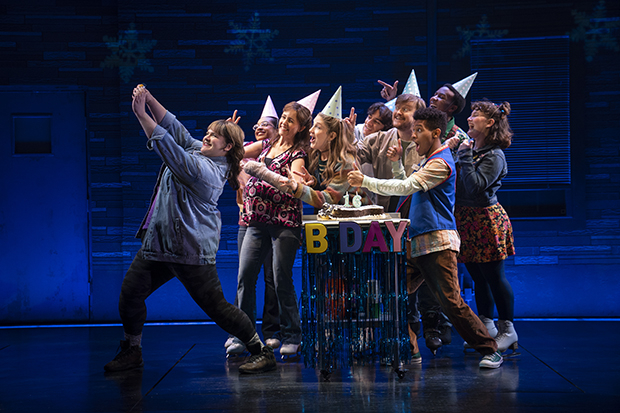”Kimberly Akimbo” review – this is the Broadway musical the UK should be talking about

© Joan Marcus
If there were to be a class on how to turn a very good musical into an excellent one, I would hope the instructors are David Lindsay-Abaire, Jeanine Tesori, and Jessica Stone. Their hilarious and heartbreaking Kimberly Akimbo received widespread acclaim for its off-Broadway run last autumn at the Atlantic Theatre Company and was rewarded with a shelfful of trophies. I would not have blamed them in the slightest for taking their audience-tested, awards-approved production and transplanting it wholesale onto the stage at the Booth Theatre. But they dug in for Broadway, reinvestigating every moment and making tiny surgical changes to help the material achieve its fullest comic and tragic potential. Kimberly Akimbo was lovely before; it’s magnificent now.
An adaptation of Lindsay-Abaire’s 2003 dark comedy of the same name, Kimberly Akimbo is a fractured family story centering on a teenager who looks like she’s a septuagenarian. Sixteen-year-old Kim (Tony winner Victoria Clark in a career-redefining performance) has an aging disorder that’s rapidly bringing her short life to an untimely close. But she’s determined to live the time she has left to the fullest and wants to road-trip the East Coast, from Six Flags to Walt Disney World. Trouble is, her dad, Buddy (Steven Boyer). is a drunk; her pregnant mom, Pattie (Alli Mauzey), is a narcissist; and her con artist aunt, Debra (Bonnie Milligan), wants to embroil her in a check-cashing scheme. Amid it all, Kim finds a friend in Seth (Justin Cooley), an anagram-loving classmate who might just be the kindred spirit she’s never had.
One of the first new musicals to open following the prolonged Covid shutdown, Kimberly Akimbo was the right show at the right time: a life-affirming investigation of mortality and loss accentuated with the kind of laughs that make you stomp your feet with delight. But those laughs — well-earned by Mauzey, Boyer, and especially Milligan — were often at the expense of the darkness, almost as though writers Lindsay-Abaire (book and lyrics) and Tesori (score) and director Stone were afraid to make the audience uncomfortable. This is ultimately a family tragicomedy, and at the Atlantic, they only really embraced the comedy.
Bringing an off-beat musical-comedy to Broadway now, without a major Hollywood star or a recognizable title, is a risk
While the extremely clever book and sweet-sounding score have not changed much, the Broadway version, which features the full original company, is imbued with the kind of darkness the show needs to work. Sometimes, it’s literal: lighting designer Jeanette Oi-Suk Yew (the only new member of the principal creative team) creates an ethereal color palate that gives certain scenes the haunted feeling they need for maximum impact. David Zinn’s set, slightly scaled up for Broadway, feels exactly the right amount of lived-in, but there’s something oddly desolate about it in a way that fits the milieu perfectly.
In other cases, it’s just a matter of striking a better balance between the tonal shifts. Boyer’s buddy is less of a formulaic alcoholic; you really feel his pain now. Mauzey has evened out Pattie’s hysterics, and we see her as a mother who’s trying to do her best but who’s too wrapped up in her own neuroses. Milligan still finds ingenious ways to steal every scene she’s in, but it’s all grounded in Lindsay-Abaire’s absurdist reality. Even the integration of four classmates (who serve as the ostensible “ensemble”) has improved; their pleasant side story is more clearly delivered by actors Olivia Elease Hardy, Fernell Hogan, Nina White, and Michael Iskander than it once was. And Cooley remains the friend we all want, as charming as ever.
These little, sometimes minuscule differences not only better serve the story, but square the focus on Kimberly herself. At the Atlantic, Clark delivered a sweet and memorable performance but often felt like a bystander in her own story, the straight woman to a vast assortment of clowns. Now, Clark is finally able to take the lead, her inherent vulnerability made even more potent by the touch of sadness in everyone’s eyes. Her facial expressions tell a whole story on their own, especially when accentuated by Sarah Laux’s costumes, which transform this 63-year-old woman into the most convincing teenager on Broadway.
The theatre industry is still being battered by the effects of the pandemic: higher costs, audiences who haven’t returned, and a raft of uncertainty. Bringing an off-beat musical-comedy to Broadway now, without a major Hollywood star or a recognizable title, is a risk. But we are all the better for it. Kimberly Akimbo is the most satisfying new musical in ages.












